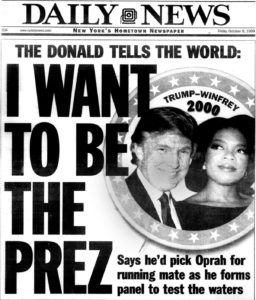As Donald Trump prepares to undergo his first medical exam as President today, there has been plenty of discussion about his fitness to carry out the duties of his office. It certainly hasn’t been the only distraction in yet another week that felt like a month.
But before this column gets underway, lets just pause, somewhat slack-jawed, and register the fact that, as I write, CNN is running a chyron with the word “shithole” in it.
There goes the news cycle. Again. It’s almost too much.
Suspect this is the first time “shithole” has been used in a chyron: pic.twitter.com/3jOoZXDYKh
— Karen Tumulty (@ktumulty) January 11, 2018
Or, given what has gone before, perhaps this latest outrage is simply what Vox described as “the core of Trumpism.”
According to CNN’s Jeff Zeleny, the President was – of course – taping a message for the upcoming Martin Luther King Jr weekend when the story about his remarks broke. The Los Angeles Times called it “the latest in a long string of racial provocations.” International condemnation was swift. Perhaps unsurprisingly, the President’s trip to London next month has been called off “amid fears of mass protests.” No word yet whether any there’s any change to his plans to show up at Davos in a week and a bit.
Even before last night’s story broke, the New York Times had already asked, in an editorial looking at the President’s fitness for office, ‘Is Mr Trump Nuts?’ Now, the question seems still more relevant.
Ok. Where were we..?
Amid plenty of discussion recently about how the President doesn’t like to read – what David Graham at The Atlantic calls “an allergy to the written word” – political observers were handed three big reading projects over the past few days.
First, and most flamboyant, was obviously Fire and Fury, Michael Wolff’s best-seller (#1 on the NYT’s “non-fiction” list), about dysfunction in the White House, for which it sometimes appeared the President was conducting his own promotional tour. Every time he attacked it on Twitter, or threatened legal action against it, there was Mr Wolff, on yet another prime-time cable show, explaining the ins and outs of what the President’s staffers really thought of him.
 An opinion piece in the Washington Post suggested that Wolff had done Trump a favour by helping him win the ‘war of ideas’ against the Steve Bannon faction within the Republican party, but that seems a reach. Sending out Stephen Miller to defend the President’s description of himself as a “very stable genius” on CNN ended how you probably might expect, and the book – its official launch brought forward by four days and despite plenty of misgivings over its sourcing and accuracy – continued to fly off the shelves.
An opinion piece in the Washington Post suggested that Wolff had done Trump a favour by helping him win the ‘war of ideas’ against the Steve Bannon faction within the Republican party, but that seems a reach. Sending out Stephen Miller to defend the President’s description of himself as a “very stable genius” on CNN ended how you probably might expect, and the book – its official launch brought forward by four days and despite plenty of misgivings over its sourcing and accuracy – continued to fly off the shelves.
What the book did, in addition to prompting a broader debate over the President’s fitness for office, was to further reinforce the idea that the White House might be an unpredictable reality show or, worse, a foul-mouthed sitcom – as Ezra Klein tweeted: “Bannon thought he was a character in House of Cards but he was actually in Veep” – and that everything the President does, says or tweets is part of a performance. Hence, after the on-camera immigration debate, when the press filed in for the photo-call at yesterday’s cabinet meeting, they were greeted with “Welcome back to the studio.”
The second reading assignment was a report prepared by Sen Ben Cardin, the senior Democrat on the Senate Foreign Relations committee, about the serious – and seriously neglected – threat posed by Russian activity targeting democracy around the globe. Writing in the Washington Post, Cardin says:
For the better part of 20 years, Russian President Vladimir Putin has engaged in a relentless assault against democratic institutions abroad, universal values and the rule of law. He has carried out these attacks with an asymmetric arsenal: cyberattacks; disinformation; support for fringe political groups; the weaponization of energy resources, organized crime and corruption; and even military aggression…
Despite the efforts of some in national security leadership, as well as dedicated career public servants across the executive branch, one person is preventing a strong, government-wide response that holds Russia accountable for its destabilizing activities: the president of the United States. Never before has the White House so clearly ignored a national security threat.
But the third – and perhaps the most fundamentally important – big reading assignment was the hundreds of pages of testimony by Glenn Simpson, the founder of research firm Fusion GPS, to the Senate Judiciary Committee, which was released by the senior Democrat on the committee, Sen Diane Feinstein. The Hill has five takeaways from the 10 hours of testimony about the infamous Christopher Steele dossier on Donald Trump’s ties to Russia, which was published by BuzzFeed a year ago on Wednesday.
Heather Digby Parton at Salon wondered if the release of the testimony is a “Watergate moment” saying: “…the upshot is that Simpson says Steele (who was effectively his subcontractor) went to the FBI because he learned in the course of his investigation that Russian agents were attempting to conspire with the campaign of the Republican candidate for president. Republicans in Congress have been trying to cover that up for obvious reasons: It’s not only damning information on its own, it’s also an indictment of every Trump associate who remained silent or played along.”
Talking of parallels with Watergate, one of its key figures, John Dean, told Politico last week that Richard Nixon might have survived if there had been a Fox News at the time.
Despite the distractions, though, all the indications are that the Russia probe is getting closer to the Presidency, with the likelihood increasing of Mr Trump being interviewed by Special Counsel Robert Mueller’s staff, regardless of how much the President might try to avoid the question. Cristian Farias writes at New York magazine that “no sane lawyer would let Trump sit for an interview with Mueller” and says:
Even Trump’s own star-studded legal team seems acutely aware that allowing Trump to be interviewed by the special counsel is a recipe for disaster. In all the reporting about Mueller’s interest in interviewing Trump, there’s an unease among the sources, all of whom are almost certainly lawyers, in the very thought of Trump being alone in a room with Mueller. They want to know where the conversation would take place, for how long, and the scope of the questioning. Short of an interview, there’s been discussion about letting Trump answer written questions from the special counsel. The implication is clear: Trump is a walking, talking perjury trap, and saving him from himself is simply what any sane, competent lawyer would advise.
With such insecurities even among the people apparently protecting the President’s interests, is it really that surprising that, as FBI agents are accused of treason, or the multiple times the White House is at pains to deny collusion, through to an apparent pre-occupation with the candidate he defeated a year ago, that observers might think the pressure of the Russia probe, along with the Wolff book, is taking its toll? David Remnick in the New Yorker pulled no punches in writing about the “increasing unfitness of Donald Trump” and saying that the West Wing “has come to resemble the dankest realms of Twitter, in which everyone is racked with paranoia and everyone despises everyone else.”
And Twitter remains, as always, the President’s go-to means of self-expression, or self-promotion, or self-exoneration. The latest example being the “explanation” for his cancelled trip to London that he tweeted late on Thursday night.
As for today’s medical exam, according to The Independent: “White House officials said that Mr Trump would not undergo a psychiatric exam. They did not say if he would undergo other screenings, such as cognitive and neurological exams.” The White House doctor is expected to give an official “readout” after the check-up.
Whatever the results, it seems unlikely it will stop what Politico calls “Washington’s growing obsession” with Trump’s mental health.
Election effect
It’s obviously too early to say what effect the fallout from the President’s remarks last night might have on prospects for Republican candidates at the midterms later this year. But one thing that will likely concern the party is the increasing number of congressional retirements. California’s Darrell Issa – the richest man in Congress – announced he would not seek re-election for a 10th term and his retirement means there will now be 31 open seats held by Republicans. The Democrats need to win 25 seats to take control of the House.
On the other hand, some interesting Republican figures are – or might be – getting themselves into the race. JD Vance, the author of another best-seller: ‘Hillbilly Elegy’ – one of the books that helped contextualize Trump’s victory – now looks to be exploring a run for a Senate seat in his native Ohio. In Arizona, meanwhile, controversial 85-year-old former Sheriff Joe Arpaio, an immigration hardliner who was pardoned last August by Donald Trump for contempt of court, is to seek the Senate seat being vacated by Jeff Flake, who’s retiring.

But for many people not remotely interested in politics, there was only one potential candidate they wanted to hear about. Oprah Winfrey’s remarkable speech at last weekend’s Golden Globes led to the inevitable speculation – or just plugged into a lot of people’s wishful thinking. Even though it’s way too early to even contemplate something like that, of course there’s polling data. The first survey of possible Democratic candidates for 2020 looked at a four-way race between Oprah, Joe Biden, Bernie Sanders and Elizabeth Warren, with Oprah running third behind Biden and Sanders.
Reacting to a piece in Politico titled The Serious Case For Oprah, Dave Roberts of Vox used a Twitter thread to explain why, having just elected one celebrity, it might not be a great idea to elect another.
Part of it read:
This idea that anyone successful & charismatic can just hop over & take the wheel of state is a reflection of the right’s decades-long effort to denigrate public service – a vocation about which it is possible to learn, at which it is possible to improve! It is its own thing. One thing Trumpian madness has me thinking is that the left needs to go back to basics. Part of that is defending the necessity and nobility of public service, along with all the good government can do. We’ve got to stop treating it like reality TV.
Suggested related stories by Steve McGookin:
Also published on Medium.
